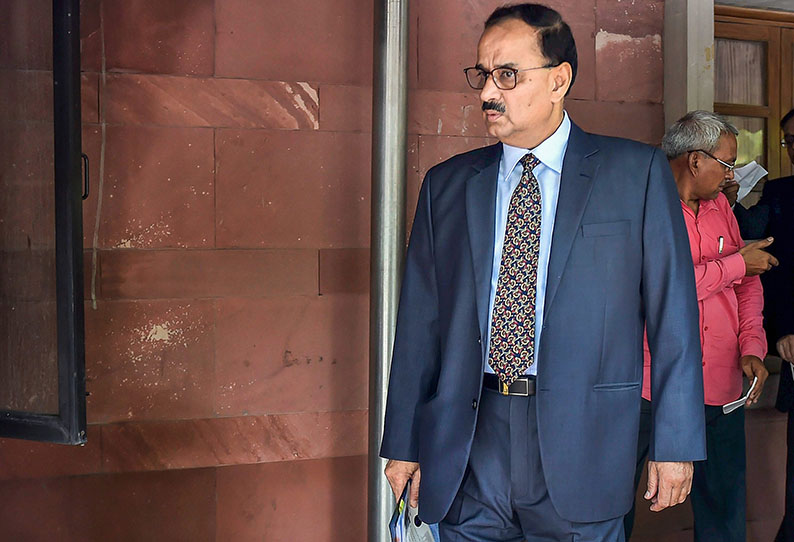Verma moved the apex court challenging the government’s decision to divest him of his role as it was “patently illegal” as per a 1998 verdict by the Supreme Court. He said the law mandates a 2-year tenure of CBI director to ensure the agency’s independence
New Delhi: Central Bureau of Investigation director Alok Verma, who was sent on administrative leave along with Special Director Rakesh Asthana late on Tuesday, had challenged the government order on various grounds.
Sources said the top CBI officers were removed in consultation with Central Vigilance Commission, which met on Tuesday to consider the goings-on at the CBI.
After the meeting, the CVC informed the government that corruption allegations levelled by Asthana against CBI head Verma were serious and Verma was not cooperating with the CVC.
It recommended that Verma and Asthana be divested of all powers and an independent team probe the allegations levelled by Asthana against Verma.
Following his ouster, Verma moved the apex court challenging the government’s decision to divest him of his role as it was “patently illegal” as per a 1998 verdict by the Supreme Court. He said the law mandates a 2-year tenure of CBI director to ensure the agency’s independence.
“Decision of transfer of CBI director rests with a high-powered committee comprising the Prime Minister, Leader of Opposition and the Chief Justice of India. Centre’s decision goes against SC directions for an independent CBI,” the petition reads.
Claiming that the autonomy of the country's premier investigating agency is being compromised, Verma said there are bound to be occasions when "certain investigations into high functionaries do not take the direction that may be desirable to the government".
The Centre is likely to argue that recent events have degraded the premier investigating agency and the government acted on the advice of the CVC. It may say that institutional integrity is important than any individual.
The Congress has also said the CBI chief can't be removed without the approval of the Chief Justice of India and the Leader of the Opposition in parliament.
According to a report in The Hindu, legal experts too believe that the CBI director cannot be transferred or stripped of his powers unilaterally by the CVC.
According to Section 4B(2) of the Delhi Special Police Establishment (DSPE) Act, which mandates that the CBI Director cannot be “transferred” without the previous consent of a high-power committee chaired by the Prime Minister.
Since the CBI Director is appointed on the recommendation of this committee which has the Leader of the Opposition and the Chief Justice of India as members. Relieving the CBI chief of his post would, as a natural corollary, require taking the consent of this committee.
The feud between Verma and Asthana began after the CBI charged the latter with demanding a Rs 5-crore bribe from Satish Sana, a Hyderabad-based businessman, in return for keeping him out of a money-laundering case against meat exporter Moin Qureshi. In turn, the Gujarat-cadre officer -- who is said to be close to Prime Minister Narendra Modi and BJP president Amit Shah -- accused his superior of several offences in a letter to the Union government.
Last Updated Oct 26, 2018, 11:47 AM IST









![Salman Khan sets stage on fire for Anant Ambani, Radhika Merchant pre-wedding festivities [WATCH] ATG](https://static-gi.asianetnews.com/images/01hr1hh8y86gvb4kbqgnyhc0w0/whatsapp-image-2024-03-03-at-12-24-37-pm_100x60xt.jpg)
![Pregnant Deepika Padukone dances with Ranveer Singh at Anant Ambani, Radhika Merchant pre-wedding bash [WATCH] ATG](https://static-gi.asianetnews.com/images/01hr1ffyd3nzqzgm6ba0k87vr8/whatsapp-image-2024-03-03-at-11-45-35-am_100x60xt.jpg)


